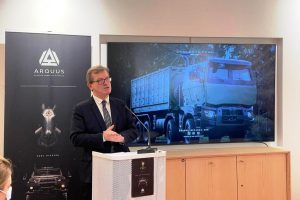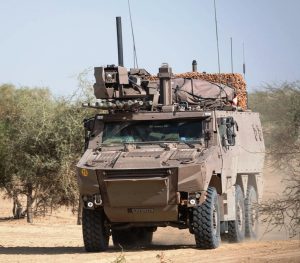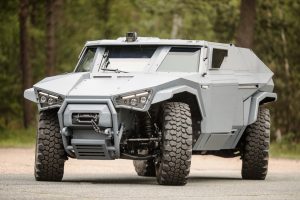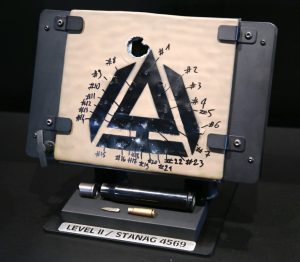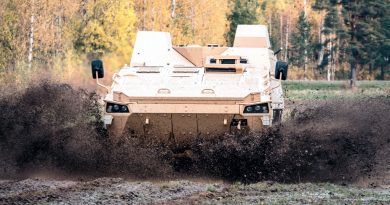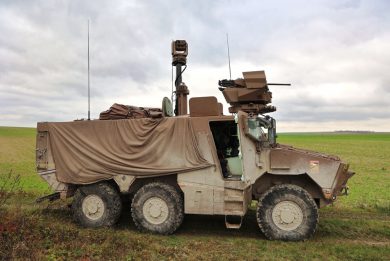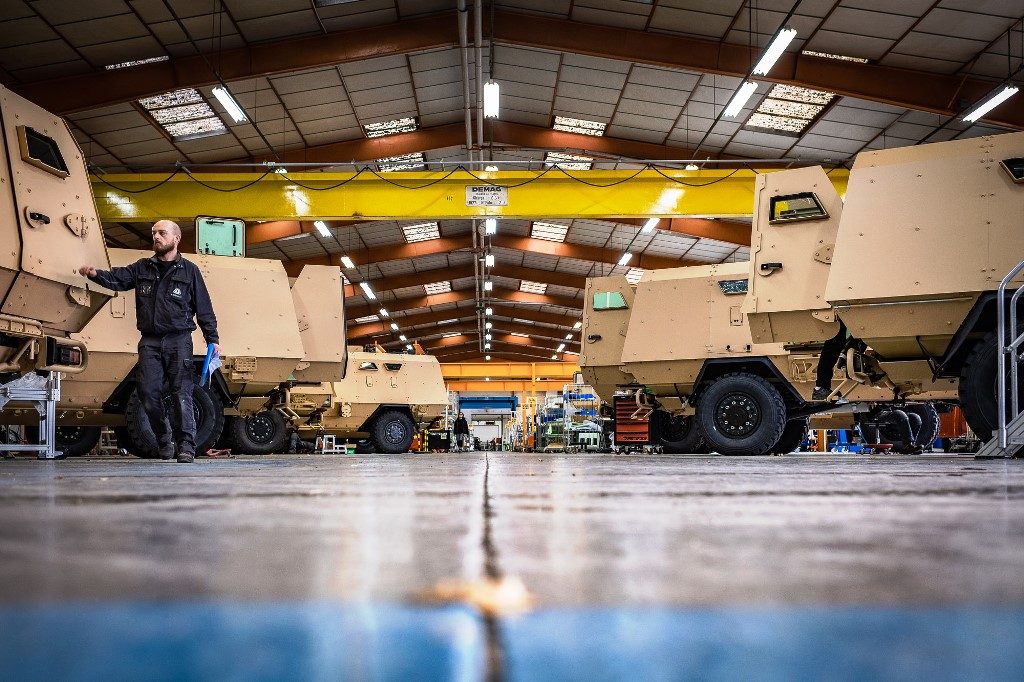
Arquus aims at getting back on the export market in 2022
“Following the reduced turnover of 2020, due to the impact of COVID, 2021 saw a rebound,” Emmmanuel Levacher, President of Arquus, tells the audience at the annual press conference held in Paris on February 16th. Amid an uncertain scenario, with medical, economic and political tensions looming over Europe and the entire world, Arquus should be back on a moderate but solid rise, similar to that of the 2017-19 period, that should bring a 1 billion Euro turnover around 2030.
With the pandemic making it difficult to maintain close contacts with potential customers, the orders logged by Arquus in 2021 saw a considerable reduction, especially on the export market. “The main shadow in our 2021 results comes from the orders obtained, which totalled 275 Million Euro on the domestic market, and only 68 million Euro on the export one, mostly from the Middle East and African regions,” Mr. Levacher stated, adding that in 2022 it will be necessary to make a quantum jump to rebalance the order book. The same will be needed for the turnover, which in 2021 shows a 90/10 split between domestic and export revenues.
“We are happy of what we did in France, as together with our partners in the Scorpion programme we delivered 119 Griffon 6×6, even ahead of schedule, and we qualified all the infantry versions. It has also been the first year that saw the Griffon deployed downrange, which required a great logistic effort in order to sustain this deployment, providing an initial projection autonomy package. Moreover in late 2021 the first 20 Jaguars were delivery to the DGA and are in the process to be deployed into the forces, the 1st Foreign Cavalry regiment being due to receive them pretty soon,” the Arquus CEO stated. Beside the vehicles, the company also delivered 186 Hornet T1 remotely controlled weapon stations, and in the mean time it qualified the lighter version, the T2, while the T3, which is installed on the jaguar, is currently undergoing the qualification process. “We got very good feedbacks on the Griffon from French units deployed as par of the Barkhane operation,” he added, Barkhane being the French-led anti-insurgent operation in Africa’s Sahel region.
The Arquus involvement with the French armed forces goes well beyond the Scorpion programme. “Last year we delivered over 1000 VT4 tactical vehicles and we plan to deliver 13000 more in 2022, we returned to the forces 72 VBL Ultima, the refurbished version of this light armoured vehicle, and 120 more will be delivered in 2022, while 2021 also saw the delivery of 56 refurbished VABs,” Mr. Levacher told the audience, adding that an intense activity of renovation of mechanical parts for legacy vehicles still in service has also been carried out. As for the two programmes for French Special Forces, the VLFS and the PLFS (respectively Light Vehicle and Heavy Weight Special Forces), tests are currently underway by the French MoD for both vehicles.
Looking at the future, while the Scorpion programme remains key to the company activity, Arquus also aims at the lucrative CRNG programme, the French acronym for new generation trailer, that will see the renewal the armed forces truck fleet, the service mostly involved in that process being obviously the Army, for which a European public call for tenders was issued on November 25th 2021, and calls for the “manufacturing and supply of approximately 9,400 trucks over an estimated period of 15 years.” Elaborating on this subject, Mr. Levacher said that “we are building a French team in order to answer this call, and we decided to tam up with Lohr-SOFRAME.” EDR On-Line understood that the latter company will be in charge of the armoured cabin and part of the equipment, while the chassis will come from Renault Trucks, Arquus acting as prime contractor, assembling the trucks in its Limoges facility, and ensuring after-sales support thanks to its experience in the MRO field and to the very dense logistic support infrastructure in France and in the dominions.
Another programme of interest for Arquus is Robin (Robot d’Ouverture d’Itinéraires), which aims at replacing Buffalo MRAPs used for route and IED clearing with much lighter unmanned systems, 3 tonnes versus over 15 tonnes of the US-made vehicle, the French Army considering the acquisition of around 50 such robots. Here too Arquus will team with other companies, as it does not have in its portfolio any UGV but is constantly increasing its know-how in automation technologies. “We are working on automated convoy solutions, and all our new platforms are designed to be easily transformed into teleoperated or autonomous vehicles,” Mr. Levacher underlined, the company being also busy in developing intelligence modules to reduce the operators’ burden as well as studies on predictive and collaborative mobility.
The VBAE, the reconnaissance vehicle that will replace the VBL in the Armée de Terre, is another programme eyed by Arquus. The company developed its Scarabee hybrid vehicle based upon what it assumed to be a possible requirement, however the latter has not yet been issued, hence Mr. Levacher made it clear that the VBAE will not be the Scarabee, although much of the work done on the latter might be the base upon which building the new vehicle. The Scarabee is now fully marketed at export, while Arquus is part of the FAMOUS programme (European Future Highly Mobile Augmented Armoured Systems) led by Patria of Finland. “This EU-sponsored programme aims at developing technologies that will then be used in future armoured vehicles,” Mr. Levacher explained, adding that the VBAE programme already sees the participation of Belgium, the potential participation of Luxembourg, Arquus being ready to involve other major countries. Asked about a possible consolidation of the European land defence industry, the company CEO looked quite sceptical.
“We must aim to win back the export market,” Levacher said, “and we aim at increasing our presence in Europe, in order to be less dependent on the Middle East and the African markets, the aim being to get as close as possible to a 50/50 split between the national and the international turnover,” the 2021 split having been 75/25. While Belgium has become one of the main Arquus export customers, through the Scorpion programme, the company CEO mentions in terms of potential European customers Romania, interested in the Sherpa 4×4 with potential local integration, Greece, with VLRA tactical trucks, Estonia, Czech Republic and Sweden. “These nations are the most accessible and open to industrial partnerships, and we hope to grab some success within 2022,” he adds. As for the other markets, asked about perspectives in Morocco to which Arquus delivered 300 VLRA trucks in 2021, Mr. Levacher confirmed that discussions are going one with that nation both for armoured vehicles and trucks, but did not comment on a possible interest for the VAB Mk3.
The Arquus CEO also underlined the company reorganisation, which saw the specialisation of each one of the facilities, as well as the creation of the Hornet Business Unit, which is now responsible for the weapon stations promotion on the international market, the aim being to install them not only on Arquus vehicles but also to other OEM platforms.
Innovation remains a key factor for Arquus, four main areas being targeted, survivability, electric/hybrid propulsion, digitalisation and connectivity. “We are working hard on new energy sources, and since the development of our VAB Electer technological demonstrator we then designed the Scarabee, born as a hybrid vehicle, and we are working on the electrified mobility chain, leveraging the Volvo know how. We are proposing a hybrid powertrain to the French DGA, and are also considering this type of propulsion for heavier equipment, talking both to the DGA and Nexter for programmes such as the MGCS and retrofit kits for other platforms,” Mr. Levacher said. In the survivability field additive manufacturing allows to work on new materiel to increase the protection level while keeping weight at bay. However that technology might prove useful also in the after-sales area, i.e. producing spares locally to shorten the logistic cycle. As for digitisation, here Arquus is looking at teaming and partnerships with industrial and academia entities. A first result was the installation of sensors into the Griffon to allow predictive maintenance.
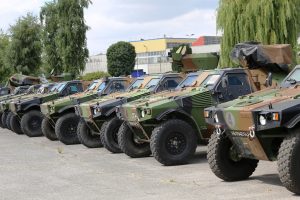
MRO is definitely a key area for the company; beside the aforementioned upgraded versions delivered in 2021, Arquus also repaired 196 VABs APCs, 104 GBC, 114 TRM 2000 18 VLRA and 23 TRM 10000 trucks and some other logistic vehicles, its Garchizy logistic hub having delivered over 1 million spares and increased by an order of magnitude its work.
Arquus definitely looks at Eurosatory as a major opportunity to restart direct relationship with many potential customers.
Photos courtesy Arquus, French MoD, P. Valpolini

